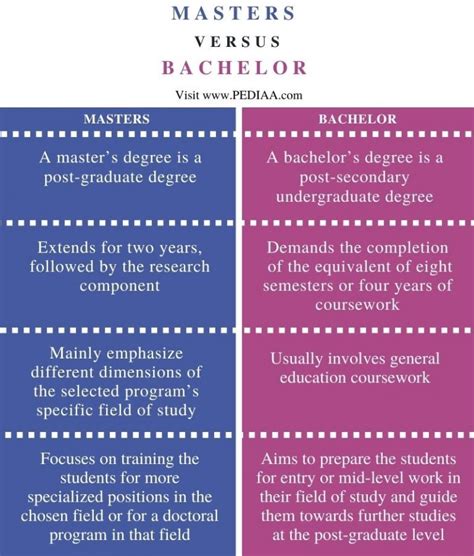Introduction

In today’s competitive job market, the pursuit of advanced education has become increasingly common. However, the decision between earning a bachelor’s or master’s degree can be daunting. This article dissects the key differences between these qualifications to help you make an informed decision that aligns with your career aspirations and life goals.
Earning a Bachelor’s Degree
A bachelor’s degree is the first level of higher education, typically earned after four years of full-time study. It provides a broad foundation in a specific field of study, such as business, science, or the humanities. As of 2021, the Pew Research Center reported that 39% of Americans aged 25 and older had earned a bachelor’s degree.
Benefits of a Bachelor’s Degree:
- Increased earning potential: According to the Bureau of Labor Statistics, individuals with a bachelor’s degree earn significantly more over their lifetime than those with only a high school diploma.
- Enhanced career opportunities: A bachelor’s degree opens doors to a wider range of professions and higher-level positions. It also demonstrates your commitment to the field and your ability to handle academic rigor.
- Personal development: Pursuing a bachelor’s degree fosters critical thinking, problem-solving, and communication skills, which are essential for success in both personal and professional endeavors.
Earning a Master’s Degree
A master’s degree is a higher-level qualification that builds upon the foundation of a bachelor’s degree. It typically takes one to two years of full-time study to complete. Master’s programs offer specialized knowledge and skills in a specific area of expertise.
Benefits of a Master’s Degree:
- Advanced professional development: A master’s degree is essential for individuals seeking to advance their careers in specialized fields such as medicine, law, or engineering.
- Higher earning potential: The Bureau of Labor Statistics indicates that individuals with a master’s degree earn, on average, 17% more than those with only a bachelor’s degree.
- Greater job security: Master’s degree holders are more likely to have secure jobs that are less vulnerable to economic downturns.
Factors to Consider When Choosing
When deciding between a bachelor’s and master’s degree, consider the following factors:
- Career goals: Determine the field you want to enter and research the education requirements for your target positions.
- Financial situation: Master’s programs are generally more expensive than bachelor’s programs. Factor in the cost of tuition, living expenses, and potential loss of income during your studies.
- Time constraints: Master’s programs require a significant investment of time. Ensure you can commit to the necessary coursework and research.
- Personal preferences: Consider your learning style, career aspirations, and life goals when making this important decision.
Tables Comparing Bachelor’s and Master’s Degrees
| Feature | Bachelor’s Degree | Master’s Degree |
|---|---|---|
| Duration | 4 years full-time | 1-2 years full-time |
| Cost | Lower | Higher |
| Scope | Broad foundation | Specialized knowledge |
| Earning potential | Increased | Significantly higher |
| Career opportunities | Wide range of entry-level positions | Higher-level positions, specialized fields |
Tips for Students
- Research potential career paths and their education requirements.
- Attend career fairs and networking events to gain insights from professionals.
- Consider your personal strengths, interests, and career goals.
- Seek advice from academic advisors, mentors, and career counselors.
- Make an informed decision that aligns with your future aspirations.
Conclusion
The decision between a bachelor’s and master’s degree is deeply personal and depends on individual circumstances. By understanding the benefits, drawbacks, and factors to consider, you can confidently choose the path that best supports your career aspirations and life goals. Remember, both degrees offer valuable opportunities for personal and professional growth. The key is to find the qualification that aligns with your specific needs and ambitions.
